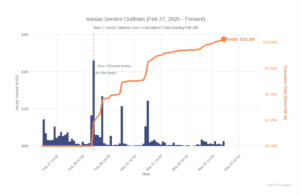Regulating Digital Assets: New York AG Letitia James Calls on Congress to Act
In a recent plea to U.S. congressional leaders, New York Attorney General Letitia James has emphasized the urgent need for federal regulation of digital assets, particularly cryptocurrencies like Bitcoin. Voicing concerns over the potential threat these digital currencies pose to the supremacy of the U.S. dollar, James advocates for a stringent legal framework aimed at protecting investors from the threats of fraud and criminal activity prevalent in the cryptocurrency space. As interest in cryptocurrencies continues to grow, James’s message underscores the importance of a balanced approach to harnessing their potential while safeguarding the financial interests of everyday consumers.
James’s statements resonate with broader concerns that Bitcoin and other cryptocurrencies may challenge the established financial order, particularly in international transactions. With trends showing increasing adoption of these digital currencies, especially among individuals and businesses seeking efficient cross-border payment methods, the urgency for regulatory measures becomes more pronounced. Drawing on insights from influential market leaders, such as BlackRock CEO Larry Fink, who foresees Bitcoin potentially serving as an alternative to the dollar amidst fiscal challenges and inflation, James is pushing for proactive measures to regulate the market.
Implementing Protections Against Cryptocurrency Fraud
As cryptocurrency transactions become commonplace among New Yorkers, AG James is also directing attention to the mounting prevalence of scams associated with these digital assets. Notably, she pointed out that millions have been lost due to fraudulent schemes within the cryptocurrency sector, further highlighting the necessity for rigorous oversight. By advocating for a legal framework that requires cryptocurrency firms to register with relevant regulatory bodies, James aims to fortify protections against this alarming trend. She argues that the enactment of robust regulations can significantly decrease instances of manipulation and fraud, ultimately benefitting millions of investors.
Moreover, the focus on stablecoins—cryptocurrencies designed to maintain parity with stable assets like the U.S. dollar—is a critical component of James’s regulatory recommendations. She has urged Congressional leaders to establish requirements for stablecoin issuers to maintain a U.S. presence and back their tokens with tangible U.S. dollars or treasuries. As stablecoins facilitate the transfer of value across the cryptocurrency ecosystem, effective regulation is essential to mitigate risks of fraud and ensure investor confidence.
The Risks of Including Cryptocurrencies in Retirement Accounts
The volatility of cryptocurrencies has led AG James to caution against their inclusion in retirement accounts such as IRAs. The significant price fluctuations characteristic of digital assets can expose investors to financial instability, especially those relying on their retirement savings. For many investors, the security of long-term savings is paramount, and the unpredictable nature of cryptocurrencies could jeopardize their financial well-being. James’s caution serves as a critical reminder for both investors and policymakers to consider the long-term implications of integrating digital assets into traditional financial planning.
In framing the conversation around digital asset regulations, James also emphasizes their implications for national security. The anonymity inherent in many cryptocurrency transactions can facilitate illicit activities, including money laundering and financing adverse regimes. To combat these risks, she advocates for the establishment of stringent regulations that would require cryptocurrency companies to adhere to anti-money laundering standards. By pushing for comprehensive regulatory structures, James seeks to bolster both investor protections and national security.
The Growing Influence of Digital Assets in Washington
The digital asset landscape is increasingly capturing the attention of U.S. lawmakers, with cryptocurrency companies ramping up lobbying efforts in Washington. During the 2024 election cycle, the industry has reportedly invested over $119 million in political contributions in support of candidates who advocate for pro-crypto policies. This growing influence is reflected in the shifting attitudes of politicians, including former President Donald Trump, who has expressed a desire to reform U.S. cryptocurrency policies, notably concerning stablecoins.
Trump’s Council of Advisers on Digital Assets has actively pursued legislative action, with key advisor Bo Hines suggesting that a stablecoin bill could be passed soon. The ongoing discussions highlight the industry’s bid for a regulatory framework that prioritizes innovation while safeguarding investors. With the recent confirmation of Paul Atkins as Chairman of the SEC, optimism builds among crypto advocates about realizing the vision of the U.S. emerging as the "crypto capital of the world."
Advocating for Striking a Balance in Regulation
Letitia James’s call to action serves as a pivotal reminder of the delicate balance policymakers must strike in regulating digital assets. While emphasizing the potential benefits of cryptocurrencies, she simultaneously advises caution to avoid the pitfalls of unregulated proliferation. By advocating for comprehensive federal regulations, she aims not only to protect investors but also to create a conducive environment for the sustainable growth of the digital asset industry.
As lawmakers continue to navigate the complexities of regulating digital assets, responses from the crypto community will likely shape future policies. The demand for clear, consistent regulations is echoed by stakeholders across the board who recognize that well-structured rules can foster innovation while enhancing consumer protection. Moving forward, fostering collaboration between regulatory bodies and industry leaders will be vital in shaping a resilient digital financial ecosystem.
In conclusion, the growing influence of cryptocurrencies necessitates a concerted effort by lawmakers, regulators, and industry players to develop a regulatory framework that promotes growth while ensuring investor protection. As discussions around these critical issues evolve, the active participation of stakeholders will be crucial in establishing a balanced approach that safeguards consumers and fortifies national security in the rapidly changing financial landscape.
















